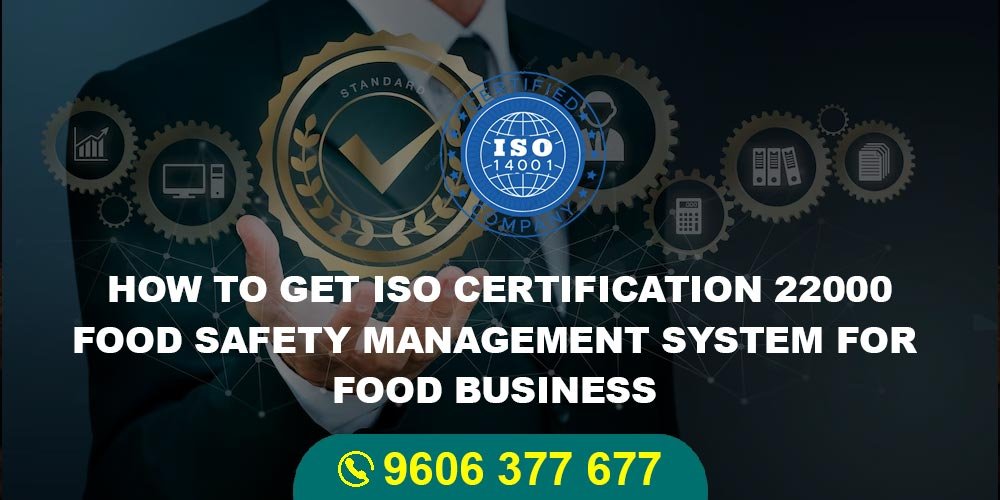How to get ISO Certification 22000 Food Safety Management System for Food Business Operators in India: The International Organization for Standardization, commonly known as ISO, is an autonomous body that establishes standards for the quality, safety, and efficiency of products and services offered by companies. In today’s highly competitive business environment, it is crucial to deliver goods and services of superior quality in order to remain viable in the market. By obtaining ISO certification, businesses can enhance their credibility and overall operational efficiency.
Deciding on the suitable ISO Certification.
In the initial stages, it is crucial to select the precise ISO certification that is necessary for your business operations. There are several types of ISO certifications accessible, which encompass
- ISO 9001 describes the standards for Quality Management.
- ISO 14001 focuses on Environmental Management.
- ISO 27001 addresses Information Security Management.
- ISO 22000 specifically pertains to Food Safety Management and so forth.
ISO 22000 Food Safety Management System
The International Organization for Standardization has developed a series of International Standards specifically aimed at maintaining food safety throughout the entire supply chain. The ISO 22000 family of standards focuses on managing food safety and provides comprehensive guidelines and best practices for mitigating risks in all aspects of food production.
The certifiable standard ISO 22000 encompasses the fundamental guidelines for a food safety management system. It mandates the implementation of specific procedures by organizations to effectively control food safety hazards and safeguard the quality of food intended for human consumption.
Considered as one of ISO’s foremost standards, ISO 22000 enjoys a high level of respect. This all-encompassing standard encompasses a diverse range of specific standards tailored to meet the needs of catering, food manufacturing, farming, packaging, and the production of animal foodstuffs and feed.
Selecting a Certification Body for ISO Compliance.
It is crucial to note that ISO itself does not offer certification to companies; instead, certification is carried out by external bodies. Hence, it is highly important to opt for a recognized and reputable certification body. When choosing an ISO registrar, it is recommended to consider the following aspects:
- Assess multiple ISO Certification service providers and verify if they adhere to CASCO standards.
- CASCO, which is an ISO committee, focuses on matters regarding conformity assessment.
- Verify if the certification body is accredited by ISO Accreditation bodies to meet the ISO requirements.
Importance of ISO certification in Food Safety Management System
The global population is experiencing a rapid growth, leading to an increased need for food. As a result, food products are frequently being transported across borders to meet this rising demand. International Standards play a crucial role in tackling this challenge by providing guidance and promoting best practices in food production methods and testing. These standards aim to ensure the safety, quality, and efficiency of the entire food industry, thus contributing to a sustainable approach. Hence the International Organization for Standardization develop a standard for Food Safety Management System known as ISO 22000.
Achieving ISO Certification: A Step-by-Step Process
Obtaining ISO certification follows a systematic process that organizations must navigate.
- The first step in the process is to identify the ISO standard that applies to the particular industry or sector. Once this standard is determined, the organization must establish and implement the necessary procedures and systems to meet its requirements. Internal audits are then conducted to ensure compliance and address any non-conformities that are identified.
- To begin the certification process, the organization needs to approach an accredited certification body. This body will conduct an independent audit to assess the organization’s processes and systems in relation to the ISO standard. The audit may involve reviewing documents, conducting interviews, and performing on-site inspections.
- If the organization meets all the requirements of the ISO standard, it will be granted certification. However, if any non-conformities are identified during the audit, the organization will be given a specific timeframe to rectify them. A follow-up audit may be scheduled to verify compliance once the non-conformities have been addressed.
What role does Legal Guides Associates play in acquiring ISO certification?
Legal Guides Associates play a vital role in assisting individuals and organizations in obtaining ISO certification. The main duty of Legal Guides Associates is to provide comprehensive guidance and support throughout the application process. They possess extensive knowledge of the legal requirements and regulations established by the International Organization for Standardization. By utilizing their expertise, Legal Guides Associates ensure that applicants meet all the necessary criteria and fulfill the mandatory documentation. Additionally, they provide valuable insights and advice on various aspects of the procedure, facilitating a smooth and efficient completion of the process. Working closely with their clients, Legal Guides Associates also address any inquiries or concerns that may arise, ensuring full compliance with ISO. Ultimately, their expertise and support contribute to a seamless experience for individuals and organizations seeking ISO certification.

